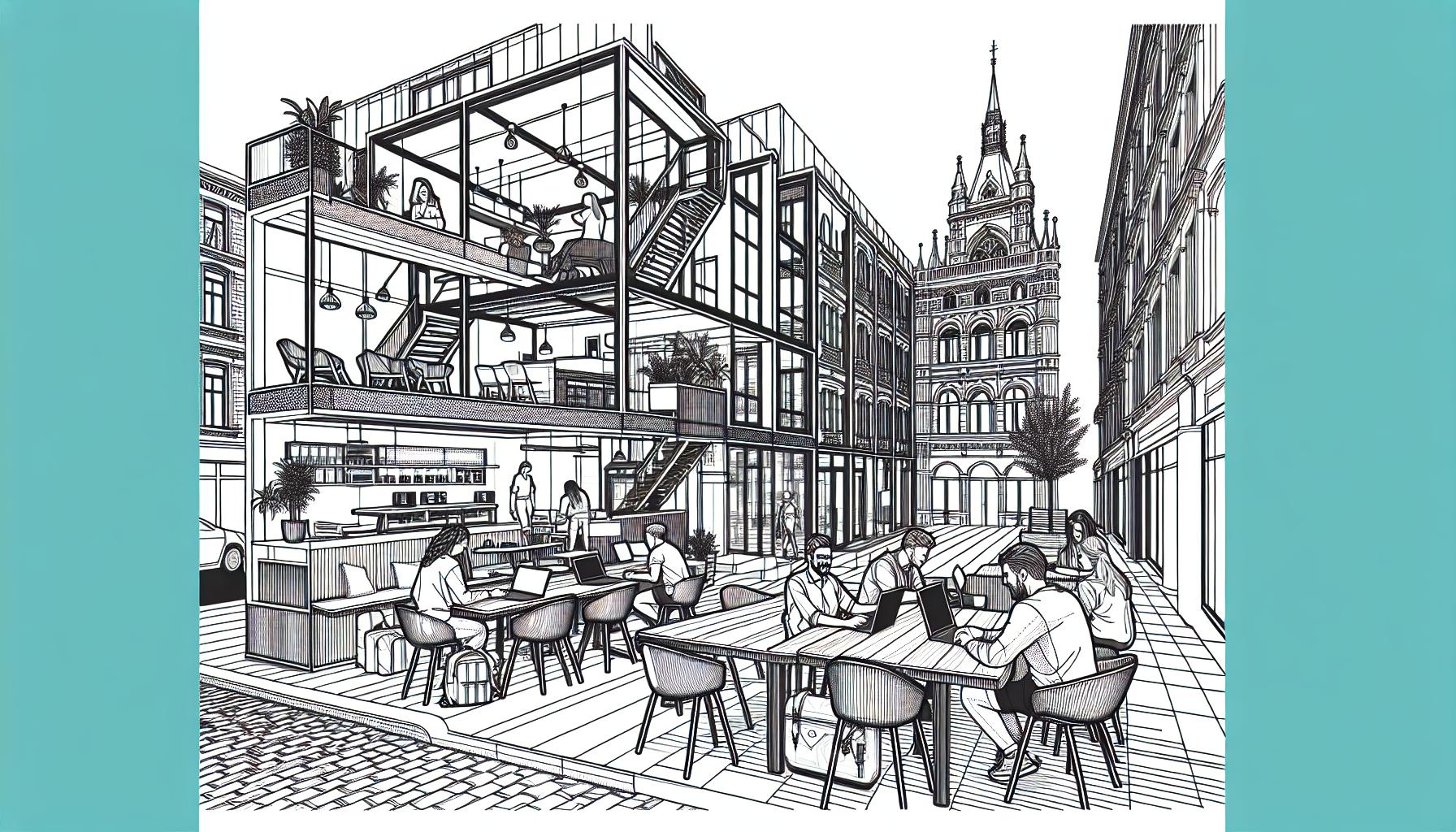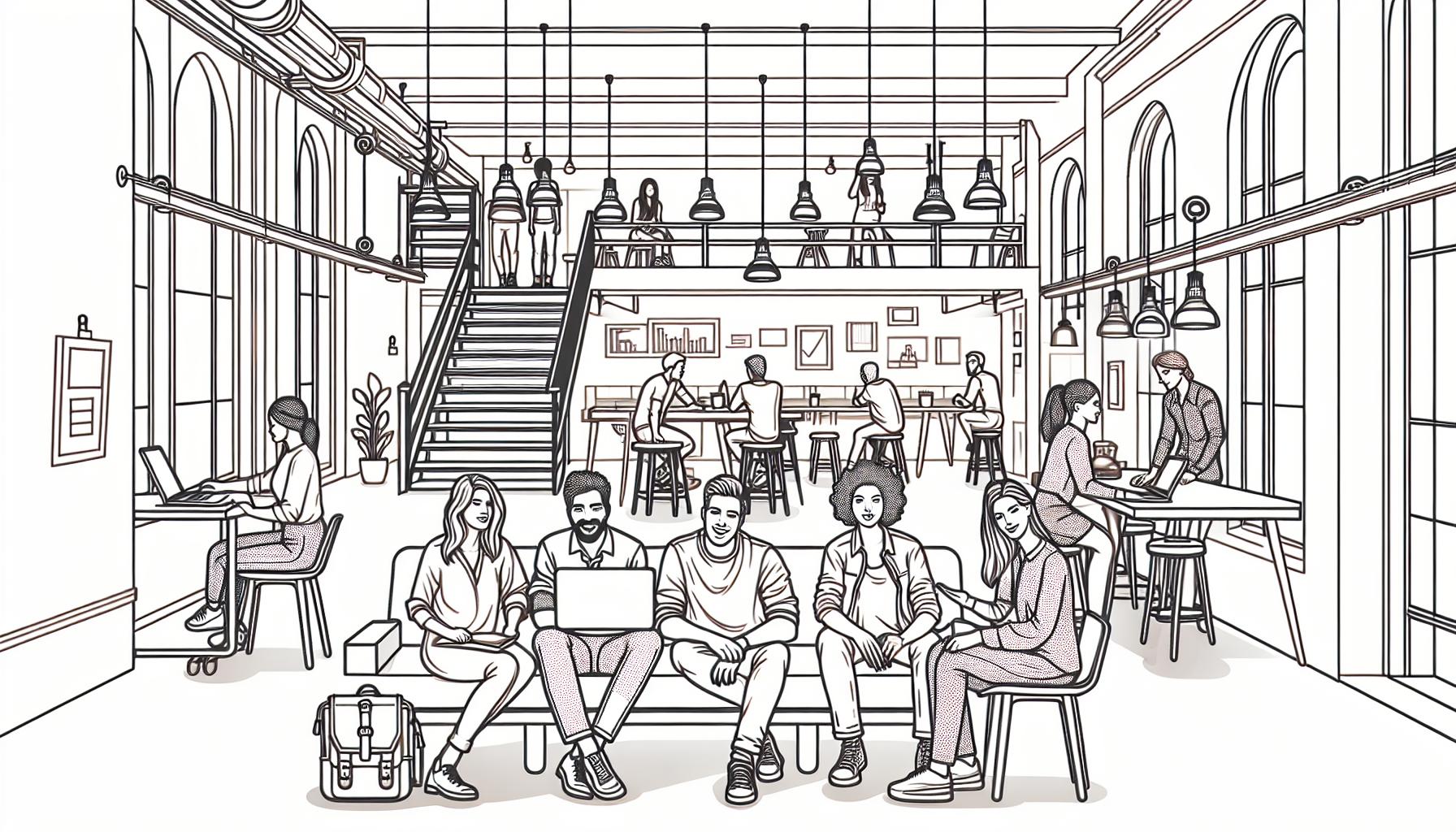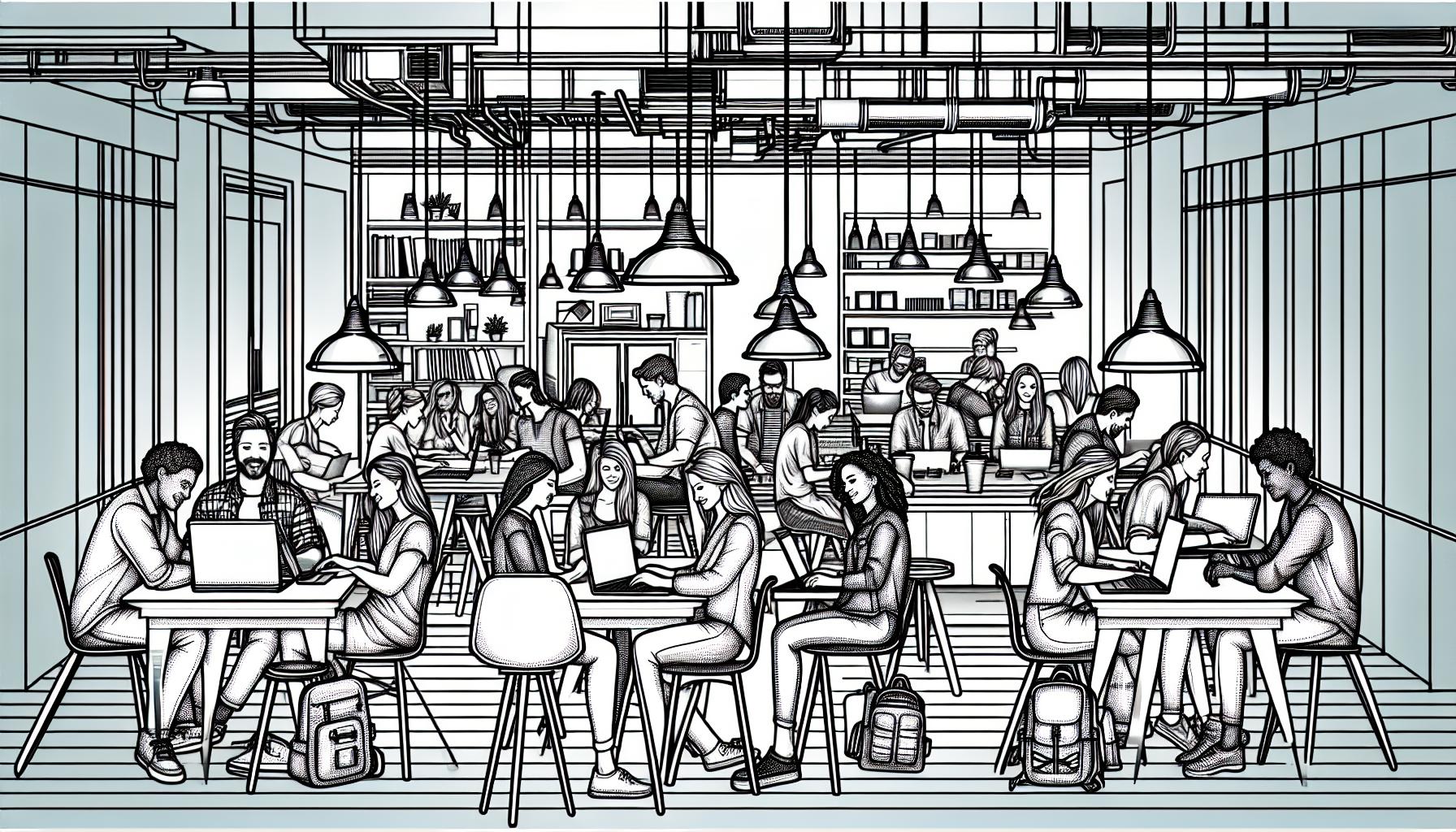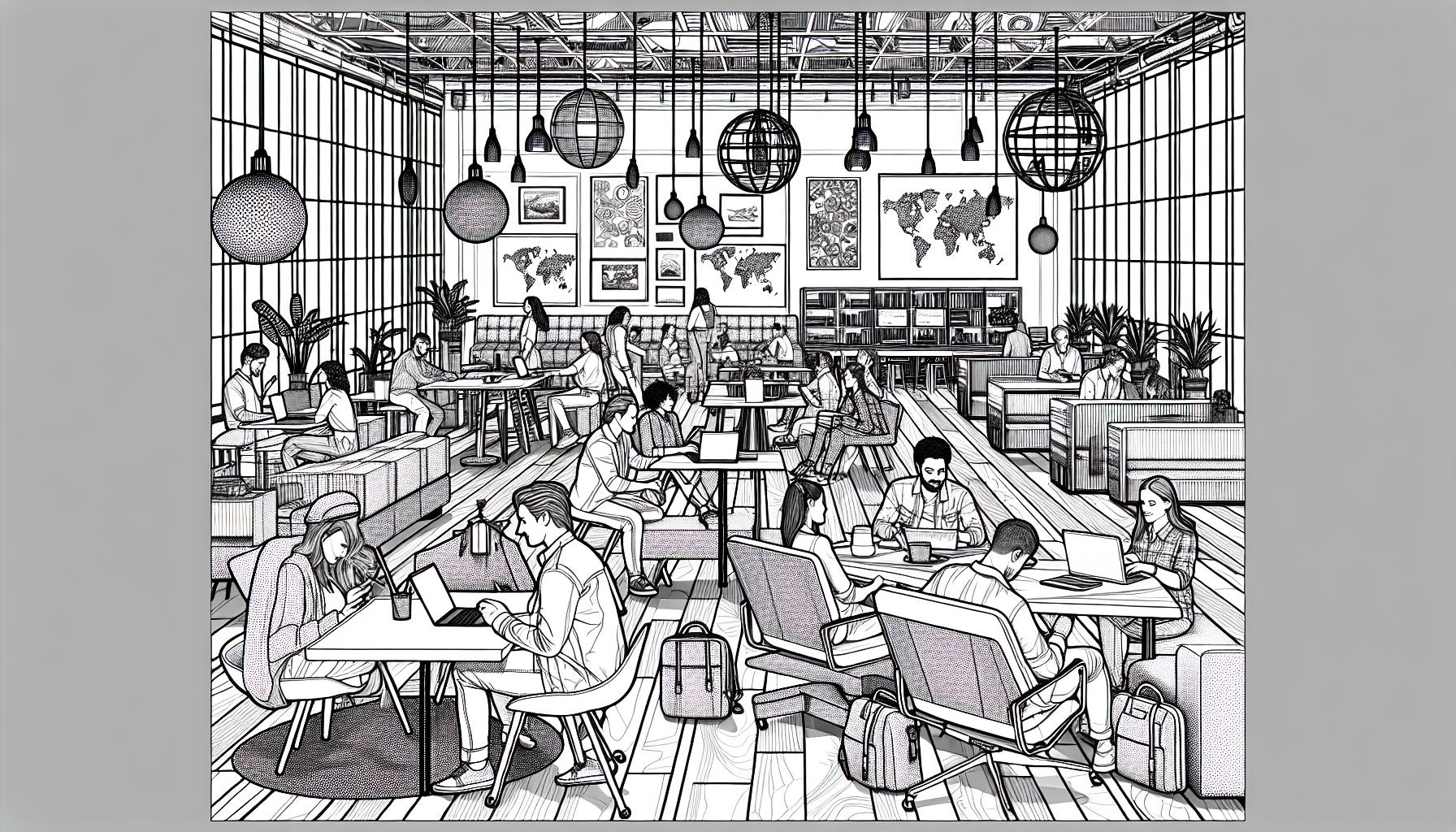Coworking hostels are the new buzz in Europe’s travel scene. They’re not just places to rest your head after a day of sightseeing. They’re vibrant, collaborative spaces where digital nomads, freelancers, and entrepreneurs meet, mingle, and get some work done.
These hostels offer a unique blend of accommodation and workspace, perfect for the modern traveler. They’re springing up across Europe, from bustling cities like Berlin and Barcelona to tranquil spots in the countryside. Each one offers a unique vibe and different amenities, but they all share a common focus on community and productivity.
Whether you’re a seasoned digital nomad or just dipping your toes into remote work, coworking hostels could be your next favorite thing. Stay tuned as we dive deeper into this exciting trend, exploring the best coworking hostels Europe has to offer.
The Rise of Coworking Hostels in Europe
As digital nomadism has burgeoned, so has a unique section of the travel industry: coworking hostels. These are not just your average spaces for travelers to rest after a long day of sightseeing. Coworking hostels offer something more – vibrant, innovative spaces where collaboration, networking, and comfort collide.
What is a Coworking Hostel?
A coworking hostel, or coliving, is a unique hybrid that combines the budget-friendly accommodation of a hostel with the productivity-focused environment of a coworking space. They are designed to cater mainly to digital nomads, freelancers, and entrepreneurs who carry their work with them wherever they go. So, it’s not just about having a comfortable bed but also a dedicated workspace with high-speed internet, ample desk space, and a quiet environment conducive to work.
These work-and-stay establishments often feature a variety of amenities, including but not limited to:
- Fast and stable Wi-Fi
- Shared or private working spaces
- Open communal spaces for social interaction
- Dedicated quiet zones for focused work
- Access to printers, scanners, and other office essentials
- Basic amenities such as lockers, laundry services, and fully-equipped kitchens
Also, these hostels host regular networking and social events that offer ample opportunities for guests to mingle, share ideas, or even form future collaborations. Coworking hostels have transformed the world of what nomadic work and travel can be.
The Appeal of Coworking Hostels for Digital Nomads
The rise of coworking hostels across Europe has catered to a growing audience whose work-life balance leans towards the digital and the nomadic. Freelancers, entrepreneurs, remote workers, and even digital backpackers have found a sense of belonging and community in these spaces.
The appeal lies not only in affordable accommodation but also in the lifestyle coworking hostels cultivate. These hostels offer a collaborative and vibrant atmosphere where individuals can work, connect, brainstorm, and relax in the same space. They’re hassle-free, without needing to scout for a coffee shop or a dedicated workspace separately. Everything’s available at arm’s length.
Not to mention, coworking hostels provide a unique networking platform. They put together like-minded digital nomads from diverse backgrounds and industries under the same roof, fostering an environment of diverse thought, innovation, and collaboration.
Given the upward trend, coworking hostels are here to stay and define the future of accommodating digital nomadism. As they grow in popularity, each hostel continues to evolve, bringing their unique blend of work, stay, and community. It’s a space you’ll want to watch and, better yet, experience firsthand.
Benefits of Coworking Hostels in Europe

This unique type of accommodation offers many benefits, creating a vibrant environment that balances work and life perfectly.
Cost-Effective Accommodation and Workspace
One of the biggest draws of coworking hostels is their cost-effectiveness. For many digital nomads, juggling rent and office space can quickly eat into their travel budget. With coworking hostels, they get a dual solution in one package: a comfortable place to sleep and a dedicated workspace with all the amenities of a standard office.
Compare the cost: a standard double room in Paris typically costs around €100 per night, while a night in a coworking hostel won’t run more than €35.
It’s a beneficial setup that lets them save money without sacrificing productivity or comfort. Everything they need is within reach, from high-speed Wi-Fi, ergonomic furniture, noise control, and communal spaces to office essentials like printers and scanners.
Opportunity for Networking and Collaboration
The atmosphere in traditional hostels can be social, but it’s often more about leisure than business. In coworking hostels, they’ve got an environment that encourages both social and professional interactions.
Here, they’re surrounded by like-minded individuals who value their work as much as their travels. These places often host networking and social events, so digital nomads have ample opportunities to connect, collaborate, learn, and exchange ideas. This can lead to new business opportunities and partnerships, inspire them to think differently or expose them to a new way of working.
These hostels aren’t just limited to the tech industry. They cater to a diverse crowd — from content creators and graphic designers to language teachers and consultants. This mix of cultures, professions, and perspectives adds another layer of richness to their stay, making coworking hostels more than just a cost-effective solution — it’s a lifestyle change.
Popular Coworking Hostels in Europe

As the demand for coworking spaces and cost-effective accommodations increases, diverse coworking hostels have sprung up throughout Europe. They are trendy among freelancers, digital nomads, and remote workers who combine work and travel. Let’s explore some standout options.
Urban House in Copenhagen, Denmark
Deep in the vibrant and bustling district of Vesterbro, you’ll find Urban House, a unique combination of hostel and coworking space. Denmark’s Urban House captures the best of both worlds beautifully: There’s a workspace with high-speed internet, so you can stay connected and productive, as well as a cozy, all-inclusive dorm room to rest and recharge after a long day. They also conduct networking events, effectively creating a community amidst their residents, something digital nomads and freelancers covet. You’ll live like a local while enjoying the amenities of a full-fledged workspace.
Outsite in Lisbon, Portugal
Next on the list is Outsite in Lisbon, Portugal. Lisbon’s warm climate, exquisite cuisine, and popular digital nomad community have made it a hotspot. Outsite takes advantage of this charming setting, creating a space where work meets vacation, and creative ideas flourish.
The coworking area has ergonomic furniture and high-speed Wi-Fi, providing a quiet, spacious area that encourages focus and productivity. And when you need a break, you can step into lively Lisbon with its thriving art scene and bustling nightlife.
Selina in Barcelona, Spain
Selina is a network of coworking hostels situated in various locations across the globe. Their Barcelona hostel is highly acclaimed for its strong emphasis on creating a convenient and comfortable workspace.
Selina encourages a productive lifestyle with chic interiors, comfy sleeping quarters, and a designated work area equipped with power plugs, extended work desks, and shared computers. Their dynamic events calendar with yoga classes, workshops, and social events gives digital nomads and freelancers a chance to unwind and network. Barcelona’s graffiti-filled streets and vibrant culture only add to Selina’s charm.
Tips for Choosing a Coworking Hostel in Europe

Before jetting off on your digital nomad adventure, you must know how to select the perfect coworking hostel to suit your needs. When looking for a coworking hostel in Europe, focus on Location, Facilities and Amenities, and the opportunity for community and networking.
Location
The first detail to consider when choosing a coworking hostel is its location. Close proximities to easily accessible transport options make getting around the city more manageable.
It’s also helpful to look for coworking hostels in locations that balance work-life experiences. Do they offer quick access to must-see sights, relaxation spots, or exercise facilities? Those factors all contribute to a productive work and travel experience.
Facilities and Amenities
Next, scrutinize the facilities and amenities offered by the coworking hostel. Digital nomads and remote workers must ensure their prospective hostel provides a quiet, comfortable working environment. A high-speed internet connection is a must, so be sure it’s available 24/7.
Regarding accommodation, it’s essential to find hostels offering diverse arrangements, from private rooms for introverted guests to dorms for those favoring more socializing.
Additional amenities include fully equipped kitchens, laundry facilities, secure lockers, and extras like a fitness center or communal bikes for hire.
Community and Networking Opportunities
A unique aspect of coworking hostels is that they offer community and networking opportunities. Check if your chosen hostel has a schedule of events or activities that foster a sense of community. Engaging workshops, communal dinners, music nights, and even yoga sessions can help break up the workday and open channels for lifelong connections.
Challenges of Coworking Hostels in Europe

Exploring the labyrinth of coworking hostel selection may seem enough, but it’s crucial to uncover the challenges that come with it.
Balancing Work and Social Life
Delving into the heart of coworking hostels, one of their primary challenges revolves around balancing work and social life. With creative minds and digital nomads coexisting in the same environment, there’s an undeniable buzz of activity.
While the networking opportunity is remarkable, maintaining a work-life balance can be quite the tightrope walk. There’s a thin line between working in a hostel environment and becoming part of an unending social event. The success of coworking hostels doesn’t solely hinge on their offer of a place to rest and work; it also involves providing a platform to blend social interaction with productive hustle.
Noise and Distractions
Another challenge of coworking hostels in Europe is the constant noise and distractions. Be it the relentless chatter during lunch hours in the communal kitchen or the clattering of keys across the large, open workspace, noise can be a big challenge. Soundproofing is rarely a priority in hostels, making it a major concern for a digital nomad seeking quiet.
Noise from constant hostel events or the occasional rude roommate also acts as a significant distractor. The appeal of a coworking hostel is its buzz, but for some, this could potentially border on disruptive noise.
Tips like investing in noise-canceling headphones or seeking out quieter spots during roomier hours of the day can be helpful. Nevertheless, recognizing this as a challenge before diving into the coworking hostel experience can make the destination more bearable for digital nomads.
To reign in the coworking hostel experience, it’s essential to understand its challenges and prepare for them in advance. Walking into a European coworking hostel, one must remember there lies a blend of cultures, backgrounds, and temperaments.
Coworking hostels in Europe offer a unique blend of work and travel, creating an environment that’s both productive and adventurous.
So, if you’re a digital nomad seeking a vibrant, community-driven workspace that doubles as your home away from home, coworking hostels in Europe are certainly worth a look. With the right choice of location, facilities, and amenities, they can genuinely enhance your work-travel journey.
